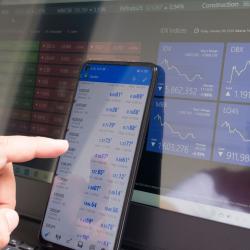For Traders, Learning Comes First
As any experienced trader knows, preparation is the key to success. For newcomers to the world of securities trading, that means getting enough preparatory education so you can start off right. Taking the time to read, do research, study the mechanics of the ordering system, and acquire other core skills will serve you well for years to come. Of course, the educational process never really ends because as the economy changes and markets go through their life cycles, you'll have to stay on top of new developments. So, what are the main advantages of doing this self-education before diving in and putting your hard-earned cash on the line? Here's a summary of the most valuable benefits that will come your way if you put in the time and effort to learn the business of trading.
You're Not Gambling
If you want to gamble, go to Las Vegas, or to your local casino or lottery ticket seller. Investing and trading is not gambling. You'll read this in any authoritative resource or, better yet, learn it from a mentor. Gambling is guessing. Yes, sometimes it's fun and you can have winning streaks by picking the right teams, numbers, or other outcomes. But when you buy and sell stocks, bonds, foreign currency, precious metals, or other investment-grade assets, you go into the transaction armed with analysis and a store of knowledge. Fortunately, the markets lend themselves to analysis. Not only can you study the fundamentals of a company, you can delve into the intricate history of its share price. Whether you end up becoming a technical or fundamental enthusiast, the setup to every quality trade consists of analysis.
It's Not a Get Rich Quick Scheme
Even if you simply scan a few elementary stock market texts, you'll see one lesson that is mentioned time and again: buying and selling stocks and other securities is not the fast road to wealth. It's a slow, challenging road that has pitfalls and blind turns just like any other way of making a living. In fact, the majority of people who trade, does so strictly on a part-time basis for a few years while holding down a regular job.
It's essential to set realistic goals about profits. For instance, look at earning a modest, single-digit profit from your investing activity, but only after you've spent at least six months getting accustomed to the environment. It takes a while to develop forex trading strategies, stock picking techniques, and other key skills. The good news is that you don't have to hold a PhD or be a genius to become a profitable investor. The sooner you realize that you're involved in a skill-based way to earn realistic profits, the better off you'll be.
Emotion is Not Your Friend
In everyday life, emotion is a good thing. It helps us connect with others, understand how people feel, and see the big picture in relationships. But your self-education will make one thing very clear in that emotion has no place in the world of investing. Placing your money on the line is an act of calculated risk, but risk informed by research and analysis.
If you let your emotions guide your investing decisions, you'll be on the fast road to financial loss. The most effective way to avoid this very common pitfall is to use a rules-based system for choosing securities and for deciding how large of an order to place. Rules help keep our emotions in check. You might love XYZ Corp. because you use their products or once worked there. But if you choose to include their stock in your portfolio, be sure to run it through the same criteria that you use for other candidates. Likewise, don't let strong negative feelings deter you from taking advantage of a potential price rise of a certain stock, currency, metal, or other asset.
Practice is a Good Thing
If you wanted to earn a belt in Judo, you'd hire a teacher or attend a class for several years. No one in their right mind expects to sign up for a martial arts class and be an expert on day one. The same is true for placing orders through an online broker. You'll quickly see that spending time on the simulator is a great way to learn. With paper trading you're using worthless paper rather than real money, is an excellent way to get the hang of order placement, money management, record keeping, and other vital skills. Some newcomers don't put one dollar of their own cash on the table until they're used the simulator for a full month.
More to Read:
Previous Posts:


